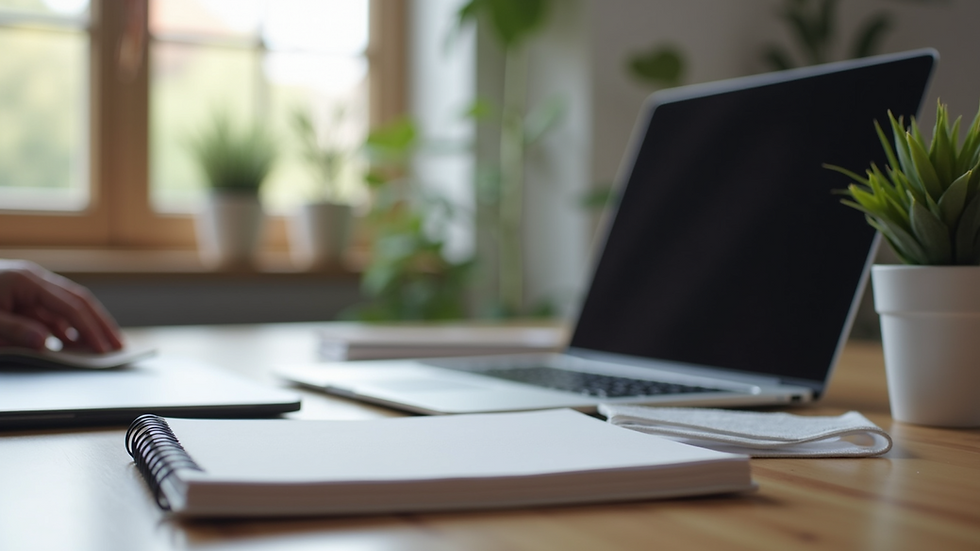Ways to Improve Focus and Retention
- Nina Waddington
- Nov 4, 2025
- 4 min read
In today’s fast-paced world, maintaining focus and retaining information can be challenging. Distractions are everywhere, and our brains often struggle to keep up with the constant influx of data. Fortunately, there are practical strategies you can use to improve your concentration and memory retention. This article explores proven methods to help you stay attentive and remember more effectively.
How to Improve Focus in Daily Life
Improving focus starts with creating the right environment and habits. Here are some actionable tips to help you sharpen your attention:
Minimize distractions: Turn off notifications on your phone and computer. Find a quiet space where interruptions are unlikely.
Set clear goals: Break tasks into smaller, manageable steps. Knowing exactly what you need to accomplish helps keep your mind on track.
Use the Pomodoro Technique: Work for 25 minutes, then take a 5-minute break. This method helps maintain high levels of focus without burnout.
Practice mindfulness meditation: Spending a few minutes each day focusing on your breath can train your brain to stay present.
Stay hydrated and eat brain-boosting foods: Drinking water and consuming foods rich in omega-3 fatty acids, like salmon and walnuts, support cognitive function.
By incorporating these habits, you can create a foundation for better focus throughout your day.

Techniques to Improve Retention and Memory
Retention is about how well you can store and recall information. Here are some effective techniques to boost your memory:
Use spaced repetition: Review information at increasing intervals to strengthen memory consolidation.
Create associations: Link new information to something you already know. For example, use mnemonic devices or acronyms.
Teach others: Explaining concepts to someone else reinforces your understanding and memory.
Visualize information: Create mental images or diagrams to represent ideas.
Get enough sleep: Sleep plays a crucial role in memory consolidation, so aim for 7-9 hours per night.
These methods help your brain encode information more deeply, making it easier to recall later.

Enhancing Cognitive Function with Working Memory Strategies
One of the key components of focus and retention is working memory - the ability to hold and manipulate information in your mind over short periods. Improving this skill can significantly boost your cognitive performance. You can explore various working memory strategies that include:
Chunking information: Grouping data into meaningful units makes it easier to remember.
Rehearsal techniques: Repeating information aloud or silently to keep it active in your mind.
Using external aids: Tools like lists, calendars, and apps can offload some memory demands.
Cognitive training exercises: Brain games and puzzles designed to challenge working memory.
By practicing these strategies regularly, you can enhance your ability to focus and retain information effectively.
Lifestyle Changes to Support Focus and Memory
Your daily lifestyle choices have a profound impact on your brain’s ability to concentrate and remember. Consider these adjustments:
Regular physical exercise: Activities like walking, swimming, or yoga increase blood flow to the brain and promote neurogenesis.
Limit multitasking: Focus on one task at a time to improve efficiency and reduce cognitive overload.
Manage stress: Chronic stress impairs memory and focus. Techniques such as deep breathing, journaling, or spending time in nature can help.
Maintain social connections: Engaging with others stimulates your brain and supports mental health.
Avoid excessive caffeine and sugar: While moderate caffeine can boost alertness, too much can cause jitters and reduce focus.
Adopting these healthy habits will create a supportive environment for your brain to function at its best.
Tools and Apps to Boost Focus and Retention
Technology can be a great ally when used wisely. Here are some tools that can help you stay focused and improve memory:
Focus apps: Apps like Forest or Focus@Will provide timers and background sounds to enhance concentration.
Note-taking apps: Tools such as Evernote or OneNote help organize information and make review easier.
Memory training apps: Lumosity and Peak offer games designed to improve cognitive skills.
Task management apps: Trello or Todoist help break down projects and track progress, reducing mental clutter.
Using these resources can complement your efforts and make it easier to maintain focus and retain information.
Building a Sustainable Focus and Retention Routine
Improving focus and retention is not a one-time effort but a continuous process. Here are some tips to build a sustainable routine:
Celebrate successes: Acknowledge your improvements to stay motivated.
Start small: Introduce one or two new habits at a time.
Track your progress: Use journals or apps to monitor improvements.
Be patient: Cognitive changes take time and consistent effort.
Adjust as needed: Find what works best for your unique needs and lifestyle.
By committing to a routine, you can gradually enhance your mental clarity and memory capacity.
Improving focus and retention is achievable with the right strategies and mindset. By minimizing distractions, practicing memory techniques, adopting healthy lifestyle habits, and leveraging helpful tools, you can boost your cognitive abilities and perform at your best every day. Start implementing these tips today and experience the benefits of a sharper, more focused mind.







Comments